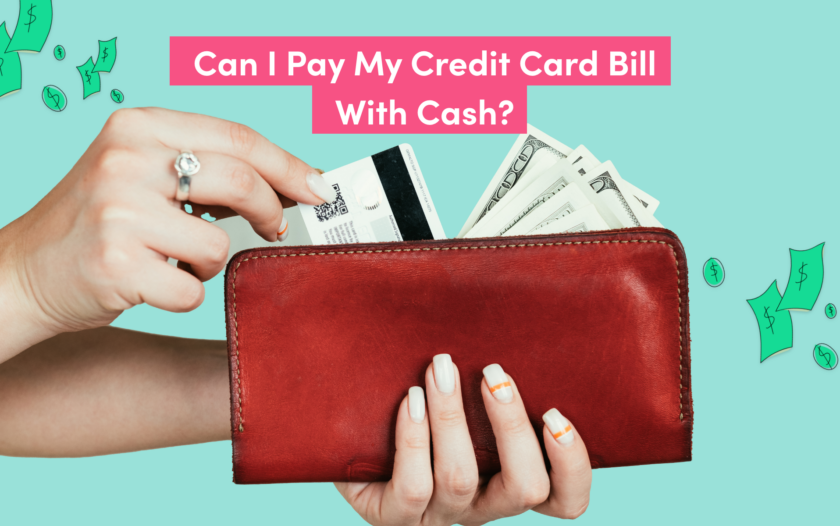Can I Pay a Credit Card With Cash?
About Caitlyn
Caitlyn is a freelance writer from the Cincinnati area with clients ranging from digital marketing agencies, insurance/finance companies, and healthcare organizations to travel and technology blogs. She loves reading, traveling, and camping—and hanging with her dogs Coco and Hamilton.
Read full bio
At a Glance
When necessary, you can pay your credit card in cash. For some people this is easier, or even the only way, to pay their bills. However, there are both advantages and disadvantages to doing so. Read on to learn more.
In this article, you’ll learn:
How to pay a credit card bill in cash?
There are a few ways you can pay your credit card bill in cash:
1. At a branch
If your credit card issuer has a physical branch or bank branch location, you can go there and pay in cash at the counter. Let the teller know you want to pay your credit card bill and provide your account number and other personally identifiable information they may request. Then, provide your cash payment.
2. Through an ATM
Go to your card issuer’s ATM and insert your credit card (as you would a debit card). On the screen, select the payment and follow the on-screen instructions to insert your cash payment. Make sure the ATM counts your cash properly.
3. Money order
You can purchase a money order with cash to mail directly to your credit card issuer. Never mail cash directly to your provider. And, be sure to mail it enough in advance of your due date so that the payment has time to mail and be processed.
Should one pay a credit card balance with cash?
There are a few situations in which paying your credit card bill in cash may make sense:
1. If you are unbanked
Most people pay their credit card bills by setting up autopay with their bank account and automatically withdrawing their balance on the due date they set. However, if you don’t have a bank account you can use, paying in cash may be your next best option. Doing so at a bank or ATM can help ensure your payments are made on time.
2. If you face technical issues
A power outage, phone issues, or other technical problems on or around the day your bill is due can cause some anxiety. However, taking cash to a branch or ATM to pay your bill can ensure you still get your card paid on time.
3. If you get paid in cash
Some workers, like servers and bartenders, get paid in cash, making it more convenient to pay some bills directly from those earnings. You don’t have to worry about taking that cash to the bank, waiting for the deposit, and then paying your card from your bank account. Instead, you can pay your bill directly with the cash.
4. If budget management involves cash
Some people primarily use cash to budget, and in this case, they may find it easiest to collect what they owe on the credit card in dollars over the month and then pay off the balance in cash. This may save you time on deposits and digital transfers, and allow you to continue using your cash envelope-based system.
Is it right to pay a credit card bill with cash?
There are some benefits to paying off your balance with cash, especially if you pay it off in full:
- No interest. Paying off your balance in full will help you avoid accruing interest, so you only owe the money you spend.
- Lower credit utilization rate. This is the ratio of how much available credit you’ve used compared to how much you have access to. Experts recommend keeping your ratio below 30%, but the lower, the better.
Keeping your ratio low and making payments on time can even improve your credit score.
If you prefer to pay your credit card bill in cash, choose a card that has physical branches or ATMs nearby so it’s easy to deposit your cash payment. Remember, mailing cash to pay your bill isn’t recommended and often isn’t accepted, but you can mail a check or money order.
As long as the credit card issuer is getting paid, they typically don’t care how they receive payment, whether it’s a direct deposit, check, or cash.
FAQs
The most secure way to pay a credit card bill is online through your cardholder account or by calling the customer service number on the back of your card and paying over the phone.
The two ways you can use a credit card to pay off a credit card bill are through a balance transfer or a cash advance. While these may be easier than paying in cash, especially if you don’t have a branch or ATM nearby, you’ll likely incur interest and fees. In this case, it may be better to pay in cash.
If you don’t have a bank account, you can pay your credit card bill in cash or with a money order. Or, you can use a different credit card by doing a balance transfer or cash advance, but these aren’t recommended due to the extra costs associated with them.
If possible, it’s better to pay your credit card with cash vs. another credit card to avoid balance transfers or cash advance interest and fees.









